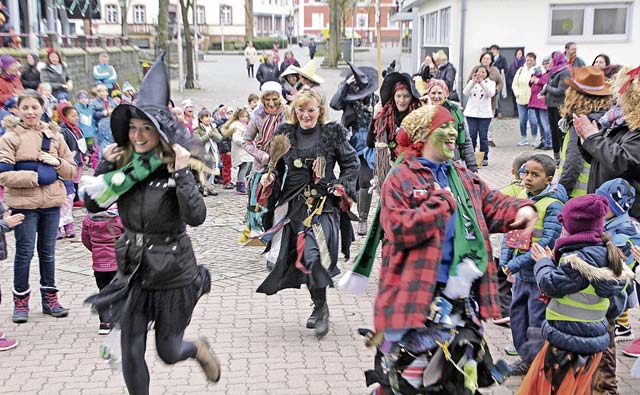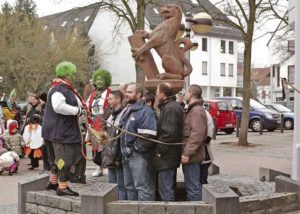
Editor’s Note: This article was published in a previous edition of the Kaiserslautern American and the information has been updated to reflect this year’s event.

Thursday will be one of the main Fasching days. It’s “Altweiberfasching,” which literally translated means “old women’s Fasching.” It’s a day specifically reserved for females.
It’s the day when men have to beware of women.
Altweiberfasching is always celebrated the Thursday before Rose Monday. Traditionally, females dress as old women or witches. They meet in the morning, walk down the streets, sing songs and in some towns they storm the town halls. They constantly look for victims — men wearing ties. As soon as they see a man with a tie — on the street, in a store, in an office — they get out a pair of scissors and “attack” the man, which means they cut his tie.
Depending on the area in which the tie cutting is performed, the woman might ask the man to either buy her a drink or lose the tie, or she cuts the tie and kisses the man. Women are allowed to act crazy that day and have fun without their “better halves.”
The tradition of women participating in Fasching goes back to the 15th century. During sermons, priests were complaining about the exchange of clothes between women and men. In 1558, the city council of Ueberlingen at Lake Constance was forced to prohibit women’s Fasching celebrations in female taverns and dormitories, because of women’s indecent behavior. But the women referred to their female rights such as drinking and dancing during specific Fasching days.
Altweiberfasching also marks the status of women in the 15th and 16th century. Wives had well-defined rights, since they were the budget keepers. During the crazy season they sat in judgment of other women who didn’t clean the house or didn’t take care of the children. Later, in several towns in Southern Germany, it became customary to sit in judgment of men. Women usually met in the conference rooms of town halls. That’s why nowadays women still “storm” the town halls on Altweiberfasching to take over control and become fully liberated as on no other day.
In Cologne, which is one of the main locations to celebrate Altweiberfasching and street carnival, women started protesting against the male government in the 1880s. The three most important persons of Fasching in Cologne — the prince, the peasant and the virgin, who actually is a man dressed like a woman — officially open Cologne’s street carnival. During the opening session, the lord mayor calls out the official carnival shout “Koelle Alaaf.” Now it’s up to the women to start their hunt.
In Ramstein-Miesenbach, at 11:11 a.m. Thursday, women in disguise will storm the Rathaus (town hall) and capture men. They will take the men outdoors and tie them to the “Narrenbrunnen,” fool’s fountain. Then the “Altweiber” will cut the men’s ties and for the fee of at least €1.11, captives will be set free again.
Traditionally women who cut ties that day hang them up as trophies. And men don’t always notice the attack on time, because it’s not necessarily just women in disguise who do it, but also normally dressed females at work. Kill-joys won’t wear a tie that day or choose to wear an old one they don’t need any longer.
Ramstein-Miesenbach’s culture center, Haus des Bürgers, will host an Altweiber Fasching party with a men’s ballet and the band Habachtaler starting at 8:11 p.m. Tickets cost €10 at the door.
Niederkirchen’s Westpfalzhalle is well-known in the region for its annual Altweiberfasching party. This year’s theme will be Star Wars. Doors will open at 7 p.m. Tickets cost €15 at the door. Advance tickets for €14 are available at the Metzgerei Hess in Niederkirchen and Otterberg.
The Kaiserslautern Carnival Club, KVK, will start its event at 7:11 p.m. in a tent and at its club house, An der Kalause in Kaiserslautern (next to Gartenschau office).
Dansenberg will hold their Fasching party March 2 from 8:11 p.m. Tickets are still available and can be purchased at the door.


